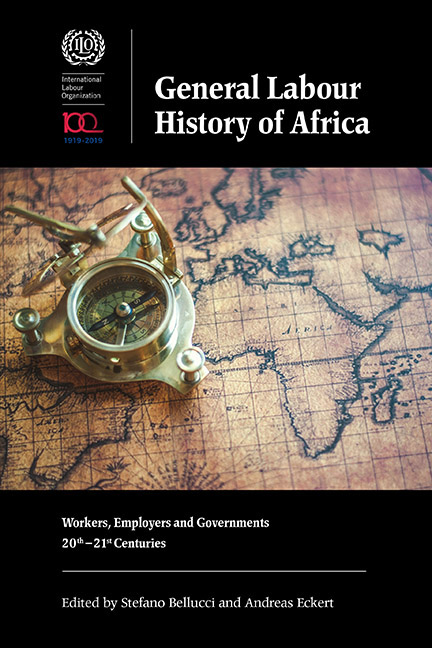Book contents
- Frontmatter
- Contents
- List of Maps and Figures
- List of Tables
- Notes on Contributors
- Foreword
- Acknowledgements
- The ‘Labour Question’ in Africanist Historiography
- Part I Free and Unfree Labour
- 1 Wage Labour
- 2 Precarious and Informal Labour
- 3 Forced Labour
- Part II Key Sectors
- Part III International Dimensions and Mobility
- Part IV Varieties of Work
- Part V Entrepreneurs and Self-Employment
- Part VI The State, Unions and Welfare
- Part VII Conclusions
- Select Bibliography
- Index
1 - Wage Labour
from Part I - Free and Unfree Labour
Published online by Cambridge University Press: 21 September 2019
- Frontmatter
- Contents
- List of Maps and Figures
- List of Tables
- Notes on Contributors
- Foreword
- Acknowledgements
- The ‘Labour Question’ in Africanist Historiography
- Part I Free and Unfree Labour
- 1 Wage Labour
- 2 Precarious and Informal Labour
- 3 Forced Labour
- Part II Key Sectors
- Part III International Dimensions and Mobility
- Part IV Varieties of Work
- Part V Entrepreneurs and Self-Employment
- Part VI The State, Unions and Welfare
- Part VII Conclusions
- Select Bibliography
- Index
Summary
WAGE LABOUR, AFRICAN LABOUR HISTORIOGRAPHY AND GLOBAL LABOUR HISTORY
Karl Marx defined the worker as a category that does not apply to all times and places. According to Marxist theory, the worker becomes a meaningful social category only when labour power becomes a commodity, that is, when a class of people without access to the means of production is created. In this context Marx famously assumed that labour power in capitalism can become a commodity in only one way, namely through free wage labour in which the worker ‘as a free individual can dispose of his labor power as his own commodity’ and ‘has no other commodity for sale’. This powerful idea led to a rather narrow concept of the working class. As Marcel van der Linden put it: ‘If only the labor power of free wage laborers is commodified, it implies the “real” working class in capitalism can only consist of such workers.’
As questionable as Marx's hypothesis may be, for a long time it appeared self-evident, as it seemed to correspond to the process by which a proletariat was formed in the North Atlantic region. In this context, two assumptions seem to be important. First, there was a fundamental change in the mid-nineteenth century linked with industrialization, when new ideas and work practices emerged. Work was legally codified, and from then on established the link between the individual and broader social groups, and especially the nation state: labour became the basis of the social and political order. In the context of the nation state and the emerging welfare state, the difference between work or labour (in the sense of gainful employment, largely performed by men) and non-work (including other activities, for example at the household level, and largely performed by women) developed. Moreover, the difference between having work in the sense of gainful employment and being unemployed was reflected in the language and the statistics of the time and also became part of social policy. Until this period, Arbeit, travail, ‘work’ and ‘labour’ had been defined in different ways but had never been limited to marketable work. But from the nineteenth century onwards, in the industrialized world, work came to be defined more or less exclusively as gainful occupation, with wage labour as its most important and most widespread form.
- Type
- Chapter
- Information
- General Labour History of AfricaWorkers, Employers and Governments, 20th-21st Centuries, pp. 17 - 44Publisher: Boydell & BrewerPrint publication year: 2019



